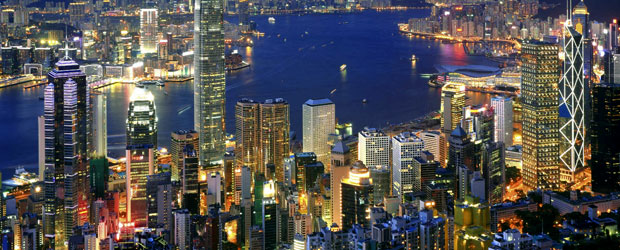Dark days in Hong Kong
Next Magazine (2014.04.03, A002, Second Opinion, Bill Stacey)
Amidst festivities for the Rugby 7’s and a flash storm on Saturday that brought night to the city in the middle of the day, it would have been easy to miss the international “Earth Hour” at 8:30pm that night. At that hour in cities across the world, monuments, buildings and households were asked to switch off their lights for an hour to save electricity and as a symbol for saving the planet.
Earth hour is a movement begun in 2007 by the WWF to bring attention to environmental issues. As a publicity gesture, it has been a phenomenal success globally. Yet the symbolism of this movement is deeply disturbing. Darkness in western tradition is often a symbol for barbarism. The ritual of baptism brings a child out of darkness into “his marvelous light”. Joseph Conrad’s Heart of Darkness tells about the fragile veneer of civilization when confronted with the reality of life in the darkest reaches of the Congo. Why found a movement for darkness, even if only for an hour?
Hong Kong more than any city in the world is a “city of lights”. From our spectacular skyline, to the vivid advertising on the streets, to nightly displays of lighting for tourists and our national tributes through fireworks at festivals, light is the motif of our shining city that never sleeps. Moreover, we cannot survive without the electricity and modern technology that runs on it. Every day it raises us in elevators to our homes, to high up workplaces and to meals in vertical food-halls unrivaled anywhere in the world. Why do we want to turn all that off?
By all means let us save money and use energy more efficiently. Indeed the lighting of Hong Kong’s major buildings and annual competition to stand out has led to innovation in large-scale lighting and display. The subtle images on ICC that enthrall us every night use a fraction of the energy that was used a decade ago for floodlights to illuminate older buildings.
Why do the much-maligned owners and builders of our tall buildings even bother to entertain us with such lighting? It is simple economics. These landmarks are valuable real estate and those well-lit ones are destinations for people and businesses to gather. The lighting may cost money, but it builds the brand value of the building, the developer and the designer. Businesses are attracted to the prestige of outstanding buildings and people are attracted to landmarks that offer comfort, amenity or excitement.Many environmentalists in Hong Kong want to reduce energy consumption by driving up its cost. They want the government to mandate expensive renewable fuel usage and oppose the development of LNG receiving stations that would allow access to cheaper gas at market prices. Meanwhile, the government has effectively required electricity companies to buy gas piped from China on very long term contracts when more commercial options were available.This is a strategy for high electricity costs and its efficacy as an environmental strategy is far from proven. Business and individuals have every incentive to economize on electricity without having government artificially inflating its price by taxes, charges and mandates. Every day we make judgments on whether to turn on or off the air conditioning by trading off a little comfort for a financial saving. We trouble ourselves to turn out the lights when we leave the office and have become masters of conserving valuable battery life on our smart phones.The right energy strategy for the government is to encourage our electricity companies to be as efficient as they possibly can and optimize their energy supply based on economic costs. Mandates that line the pockets of wind turbine manufacturers and favored renewable energy suppliers should be avoided. Only when faced with normal economic incentives, will the lowest cost, most efficient and least polluting energy be discovered and developed.The message is the same for environmentalists. Massive high-rise cities like Hong Kong are actually more energy efficient than sprawling suburbs and lower density cities, and we should celebrate their marvelous light, not seek to turn off these beacons of enterprise.
Bill Stacey is in his 10th year as a resident of Hong Kong and is Chairman of the Lion Rock Institute.We are now on Facebook http://www.facebook.com/

